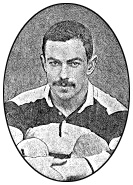Rugby career
Sweet-Escott was born in Essington, Staffordshire, and played club rugby for Blackheath F.C. before moving to Wales and joining first class Welsh club Cardiff. In 1891 he was first selected to represent the Welsh national team, in a match against Scotland as part of the Home Nations Championship. Under the captaincy of Llanelli's Willie Thomas, Wales were heavily beaten with Scotland running in seven tries without reply. Sweet-Escott lost his place in the Welsh team for the next game, with the Welsh selectors switching from the Cardiff partnership of Sweet-Escott and Ingledew to the exciting Swansea brother duo of Evan and David James.
In 1891, Sweet-Escott was chosen to represent the British invitational team, the Barbarians. He continued his career with Cardiff, and after a lapse of three years regained favour with the Welsh selectors, regaining his position in the Wales squad, this time alongside Newport's Fred Parfitt. As part of the 1894 Home Nations Championship and this time led by Frank Hill, Sweet-Escott found himself again on the losing side when Ireland won by a single penalty goal. Sweet-Escott's last game for Wales was another match against Ireland, in the following year's tournament. In this, his final international, Sweet-Escott finished on the winning side.
International matches played
Wales [4]
This page is based on this
Wikipedia article Text is available under the
CC BY-SA 4.0 license; additional terms may apply.
Images, videos and audio are available under their respective licenses.
